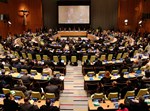Social Watch E-Newsletter - Issue 275 - September 23, 2016
Published on Fri, 2016-09-23 16:26
 |
| Issue 275 - September 23, 2016 |
|
|
| |
Check out new web feature
"Global Policy Watch Notice Board" for updates on current affairs of the United Nations in New York
|
| |
|
| |
Argentina: moving away from the 2030 Agenda?
|
| |
|
| |
 |
The adoption of the 2030 Agenda by the UN coincided with a change of government in Argentina, which is reversing the public policies that were put in place to deal with the serious social, economic, institutional and political crisis of 2001 and 2002.
In its first months in power, the political coalition Cambiemos (Spanish for Let's change) shifted away from a development model based on strengthening the domestic market, trade protectionism, expansion of social rights and an active role of the state in income redistribution through the collection of taxes on exports of agricultural products, towards a model favouring free trade, a competitive position in the global market, a lower level of state intervention in the overall economy and a reduction in taxes for the rich. Instead of continuing to expand social protection as required by the SDGs, the current government is aligning public policies with the interests of the sectors with greater political and economic power. The violation of various economic and social rights, which has occurred in a very short time, is creating a gradual and growing rejection within different social sectors. Read more
|
| |
|
| |
Forty Social Watch coalitions around the world are contributing their assessments and reports to the global Social Watch report 2016, under the overall theme Goals for 2030... and obstacles to getting there. The Social Watch network contributes these analysis to the current global discussions around implementation of the 2030 Agenda, which just will not happen without civil society independent monitoring.
The Social Watch national platforms are independent coalitions of civil society organizations struggling for social and gender justice in their own countries. The Social Watch network has been publishing since 1996 yearly reports on how governments implement their international commitments to eradicate poverty and achieve equality between women and men.
|
| |
|
| |
|
| |

A session of the HLPF. (Photo: UN)
|
The 2030 Agenda is both a problem and a solution for the UN system. The UN, especially the UN development system, must be encouraged to return to its value-driven role in the public interest, grounded in the explicit adoption of norms and standards and delivered through programming that does not deviate from its core business. Otherwise it will find itself caught in a self-inflicted vicious circle of decline. “More of the same” will see the continuation of its shrinking role in global affairs at a time when so many challenges require international co-operation and resolve. Read more
|
|
| |
|
| |
|
| |
Unfortunately, whenever civil society and government strike discussions on human rights a certain unease sets in. The mood quickly dampens. On one hand, government mounts a defensive posture and on the other, civil society embarks on an offensive strategy. This gets worse when you throw in the word taxation. Like a spark to an inflammable concoction, you have the perfect recipe for an explosive discussion.
In East Africa, arguments for increasing expenditure on economic, social and cultural (ESC) rights as articulated by civil society are met by a stern and covertly dissenting response from government. The argument is often along the lines that ESC rights are of progressive, as opposed to immediate, realization. Simply put, these rights will take an unspecified lapse of time to realize. Read more
|
|
| |
|
|
|
| |
|
SOCIAL WATCH IS AN INTERNATIONAL NGO WATCHDOG NETWORK MONITORING POVERTY ERADICATION AND GENDER EQUALITY Social Watch >>
Social Watch E-Newsletter For comments, sugestions, collaborations contact us at: socwatch@socialwatch.orgTo stop receiving this newsletter send a message with the subject "unsubscribe" to: socwatch@socialwatch.org |
|
|
|
SUSCRIBE TO OUR NEWSLETTER
Submit
|
